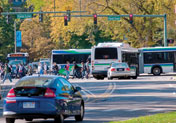Greater Lansing Next Initiative Galvanizes Regional Development Efforts
In November 2009 the Lansing Economic Area Partnership (Leap, Inc.) rolled out a new economic development plan for Michigan's Tri-County Region (Ingham, Clinton and Eaton counties) before an audience of 270 business and community leaders at the MSU Wharton Center in East Lansing. Greater Lansing Next: A Plan for Regional Prosperity was unveiled with a tremendous amount of media enthusiasm and the hope that it could galvanize a coordinated effort by business, government, and nonprofit organizations to guide the region to greater prosperity.
At the time of the rollout, Denyse Ferguson, then Leap, Inc. CEO and president, said, "The Greater Lansing Region now has a consensus strategy around which to work cooperatively. We have already begun receiving commitments from regional partners including businesses, NGOs and local governments to take the lead in implementing the seven strategies in the plan."
The Greater Lansing Next plan was based on 10 months of intensive study of regional assets and opportunities by MSU's Land Policy Institute (LPI). The rocess was based on a strategic growth paradigm, developed by former director Soji Adelaja and others at LPI, which accentuates regional place-based strategies for sustainable economic development. LPI's Mark Wyckoff prepared the plan in partnership with the Leap, Inc. staff and Board of Directors. Leap, Inc. is playing a lead role in promoting Greater Lansing Next, building support and helping to ensure that everyone who wants to help implement the plan has a meaningful role.

The research that went into creating the plan is embodied in four reports. The first report documented regional assets, comparing the Lansing region to 55 similarly-sized regions around the nation. The second report examined technical information on 10 clusters of business activity in the region. Four of those clusters emerged as growth industries of consequence: finance and insurance, healthcare, life sciences, and information technology. The third report identified key problems, opportunities, gaps, and strategies that could be pursued to improve job and talent creation and retention in the region. The fourth and final report synthesized and categorized the highest priority strategies.

The Leap plan led to LPI providing assistance to all 14 state-designated regional planning commissions in 2010 to develop draft regional strategic growth plans patterned after the lessons learned in preparing the Leap plan. This phase of the project was part of the Michigan Prosperity Initiative, a joint project between MSU and Michigan state government (see http://www.landpolicy.msu.edu/MPI for more information about MPI).
Leap, Inc. has followed up on the energy generated by the publication of the Greater Lansing Next plan with the creation of an online community (at http://greaterlansingnext.com) for sharing news, thoughts, and project updates. Recent activities include a call to "regional experts" to define quantitative benchmarks for tracking progress along with a request to the community at large for data related to the seven key strategies of the plan.
- Photographs courtesy of University Outreach and Engagement